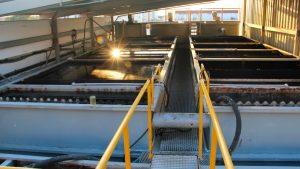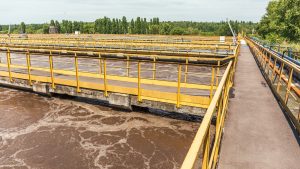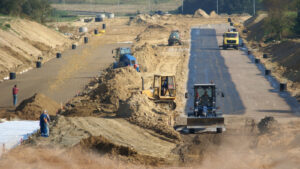The importance of wastewater systems to society and how vulnerable they are to the effects of climate change. Numerous effects of climate change on wastewater systems might have broad repercussions over varying timescales. Understanding the science and local knowledge is essential for developing effective adaptation strategies since it is increasingly acknowledged that controlling the performance and placement of wastewater systems depends on adaptation to climate change. International analyses addressing more general societal effects of climate change, such as infrastructure damage and decreased service levels, have often examined the effects of climate change on wastewater systems. Urban wastewater systems are expected to face several issues in the coming decades, one of which is climate change.
According to estimates, wastewater treatment plants have two effects as a result of climate change. Climate change will consequently have an impact on the processes taking place at wastewater treatment plants (WWTPs); more severe weather events and earlier snowmelt runoff will result in more untreated sewer overflows, more flooding, etc. As climate change quickens, wastewater reuse will be more important due to the shortage of water supplies. Wastewater treatment facilities do, in a variety of ways, increase global greenhouse gas emissions. Since most greenhouse gas emissions come from (non-fossil) carbon, they have traditionally been considered to be carbon neutral. This article will cover the solutions that will address these concerns as well as how the wastewater sector will be adversely affected by climate change.
Issues of Climate Change Surrounding Wastewater
We take into account the following wastewater system elements when evaluating the effects and consequences of climate change: wastewater conveyance systems, including pump stations, wastewater treatment plants, and on-site wastewater treatment plants. The performance of the soakage field as a result of groundwater changes, ecological changes, changes in soil structure, floating, a performance that varies with temperature, and an increase in odours are highlighted as the most significant impacts of climate change on on-site wastewater systems. Here are a couple of ways in which climate change negatively impacts the wastewater industry.
Rising Sea Levels
Raising groundwater tables and sea-level rise will result in more likely occurrences of saturated soil. As a result of changing environmental conditions, current wastewater systems may no longer be able to deliver acceptable service. This might happen as a result of increased flooding in combined wastewater pipes, repeated storm damage, or sea level rise flooding WWTPs and pipes. Wastewater treatment facilities are built to handle a specific amount of water each day. To prevent overloading the system when a plant gets excessive amounts of rainwater too rapidly, it releases untreated wastewater into the environment. More high-volume days will probably result in more frequent discharges of untreated wastewater as a result of climate change’s increased frequency of rainstorms.
Water Scarcity
Water demand will increase exponentially as a result of population growth, rising affluence, and the growth of urban areas, while the supply will become more sporadic and unpredictable due to climate change. More than 40% of the world’s population already experiences water scarcity, and with climate change, this number is expected to increase. New difficulties will result from climate change. Short-term water conservation during droughts and longer-term water use reductions from indoor efficiency improvements present challenges for wastewater treatment. These variables are mainly outside the sector’s control. Reduced indoor water use can harm infrastructure and lessen the efficacy of current treatment methods. These difficulties could get worse as water efficiency improves and severe droughts become more common as a result of climate change. The key to handling these changes is improved communication and information sharing with water suppliers, as well as sector-wide preparation for upcoming droughts. Additionally, climate change may worsen the effects of wastewater overflows into the ecosystem.
Responding to Climate Change
Likely, your WWTP is already experiencing flooding or severe droughts, both of which have been worse recently due to climate change. Treatment facilities can rapidly become overburdened by high volumes of stormwater. Dry, hot locations are also becoming even drier. Both situations are undesirable. Both place a strain on the availability of clean water and frequently have detrimental effects on the local economy and ecology. Here are a couple of treatment plans that can help reduce the effects of climate change. Reconfiguring current treatment methods concentrates on changing high-energy procedures to low-energy ones. Although this approach poses the most difficulties, it has the potential to lower the concentration of pollutants in wastewater and reduce carbon footprint.
Recycling Water
Arid regions can increase water reuse. The proper management of wastewater is an effective investment in the well-being of people and ecosystems. Wastewater is a valuable resource in the circular economy. Several nations are turning to the treatment and reuse of wastewater to recover water and energy as crucial development and climate measures. In areas where climate change will exacerbate drought and water stress, more efficient recycling and reuse of wastewater might produce vital new water supplies for agriculture, industry, and even drinking. In the coming years, it will be more crucial than ever to upgrade your water treatment capabilities to boost reuse potential and generate additional economic benefits. Focusing on this now will put you far ahead of the curve as new environmental regulations are enacted and governments’ interest in the circular economy is codified in legislation.
Eco-Friendly Chemical Treatment
By capturing their carbon dioxide emissions and turning them into other fuels, wastewater treatment plants can reduce their emissions. The usage of microbial fuel cells, which use electron transfer to capture the power produced by microorganisms and directly extract electrical energy from organic materials found in the waste stream, is a groundbreaking breakthrough. When a proton exchange membrane divides the electron donor from the electron acceptor, a biofilm of microorganisms forms on an electrode and an electrical current is produced. This technique is still in the development stage, and significant improvements in process efficiency and economics will be needed before it can be widely used to generate electrical energy directly from organic matter found in wastewater.
Take Action Today
If we continue to ignore these problems or opt for quick fixes, we will confront challenges in the next few decades such as the breakdown of water treatment facilities and the deterioration of water quality, to name just a few. Because most of the threats are irreversible and substantial, there is clear and convincing evidence that action on climate change must be taken now. The wastewater industry, which is essential to safeguarding the environment and the public’s health, is at a critical juncture. Drought, population increase, technological advancements, and changes in legislation all have an impact on the availability and demand for water. Consider taking the first step toward a clean, sustainable future for the wastewater sector.







